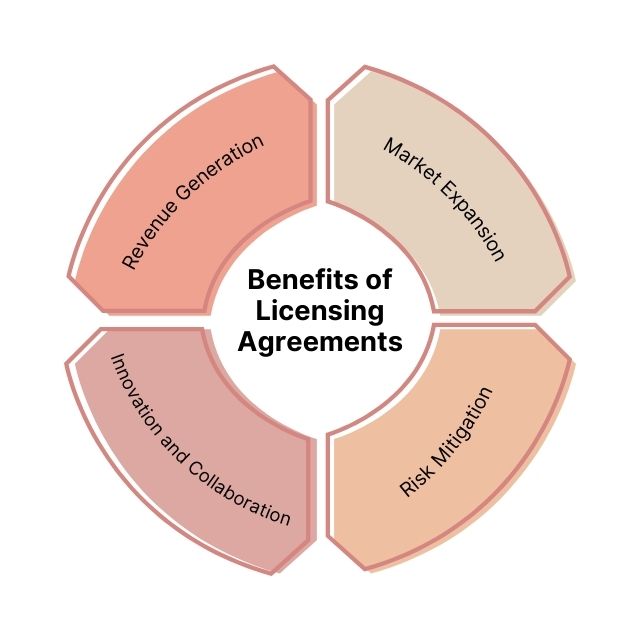

Licensing agreements are essential instruments in modern business, empowering entities to capitalize on their intellectual property assets for mutual benefit. By granting a licensee the right to utilize their intellectual property, licensors can extend their market presence, diversify revenue streams, and foster innovation. Conversely, licensees gain access to valuable intellectual property without the burden of creating it themselves, enabling them to enhance their products or services and enter new markets.
Understanding the intricate dynamics of licensing agreements is crucial for navigating the complexities of intellectual property management. These agreements typically encompass various key components, including the identification of the parties involved, a comprehensive description of the intellectual property being licensed, the scope and duration of the license, territorial restrictions, exclusivity arrangements, royalty structures, and payment terms. Each component plays a pivotal role in shaping the rights and obligations of both parties and ensuring clarity and fairness throughout the agreement.
Various types of intellectual property can be subject to licensing agreements, including patents, trademarks, copyrights, and trade secrets. Depending on the nature of the intellectual property and the objectives of the parties involved, licensing agreements may vary in scope, complexity, and duration. Whether it’s licensing patented technologies to facilitate product development, granting trademarks for brand expansion, or licensing copyrighted content for distribution, these agreements serve as versatile mechanisms for unlocking the value of intellectual property assets across diverse industries and sectors.
Ultimately, licensing agreements facilitate mutually beneficial arrangements that promote innovation, collaboration, and market expansion. By understanding the nuances of licensing agreements and effectively navigating their complexities, businesses can harness the full potential of their intellectual property portfolios while fostering growth, profitability, and competitive advantage in today’s dynamic marketplace.
Licensing agreements are contractual arrangements between a licensor and a licensee that grant the licensee the right to use the licensor’s intellectual property under specified terms and conditions. Intellectual property refers to intangible assets such as patents, trademarks, copyrights, and trade secrets. These agreements outline the scope of the license, including permitted uses, duration, territory, exclusivity, royalties, and any other relevant terms.

Licensing agreements play a vital role in today’s global economy, enabling businesses to monetize their intellectual property assets while fostering innovation, collaboration, and market expansion. By understanding the key components, types, and mechanisms of licensing agreements, businesses can effectively leverage their intellectual property to drive growth, mitigate risks, and achieve strategic objectives in various industries.
Did you find this Legitt article worthwhile? More engaging blogs about smart contracts on the blockchain, contract management software and electronic signatures can be found in the Legitt Blogs section. You may also contact Legitt to hire the best contract lifecycle management services and solutions.
A licensing agreement is a contract between a licensor and a licensee, granting the licensee the right to use the licensor's intellectual property in exchange for compensation.
Intellectual property such as patents, trademarks, copyrights, and trade secrets can be licensed.
Key components include parties involved, description of intellectual property, scope of license, duration, territory, exclusivity, royalties, and payment terms.
The duration varies and is defined in the agreement, including start and end dates, renewal options, and termination provisions.
Yes, a licensing agreement can be exclusive, granting sole rights to the licensee, or non-exclusive, allowing the licensor to grant licenses to others.
Royalties can be based on various factors such as sales, usage, or a fixed fee, as specified in the agreement.
Benefits include revenue generation, risk mitigation, market expansion, and fostering innovation and collaboration.
Licensing agreements involve negotiation, drafting, execution, implementation, monitoring, and potentially renewal or termination.
Risks include intellectual property protection, contractual disputes, competitive risks, and international considerations.
Yes, licensing agreements may include provisions for early termination under certain circumstances, as specified in the agreement.
Yes, licensors may grant multiple licenses to different licensees, each with its own terms and conditions.
Breaches of the agreement may result in legal action, termination of the license, and potential damages or penalties.
Yes, licensing agreements may vary depending on the industry, product, or type of intellectual property involved.
Yes, licensing agreements may include provisions for assignment or transfer with the consent of the parties involved.
Registration requirements vary by jurisdiction and the type of intellectual property involved.
Yes, licensors may include quality control provisions in the agreement to ensure the licensed products or services meet certain standards.
Tax implications may vary depending on the jurisdiction and the specific terms of the agreement, requiring consideration by both parties.
Yes, licensing agreements may include clauses specifying dispute resolution mechanisms such as mediation, arbitration, or litigation.
Yes, licensors may grant sublicenses to third parties with the consent of the licensee, as specified in the agreement.
Yes, licensing agreements may include provisions for renewal upon expiration, subject to the mutual agreement of the parties involved.
Categories Contract Management SoftwareAssisted Contract Lifecycle Management with the power of AI and Blockchain. Manage Contracts Smarter, Faster and Easier with intelligence embedded in each step.